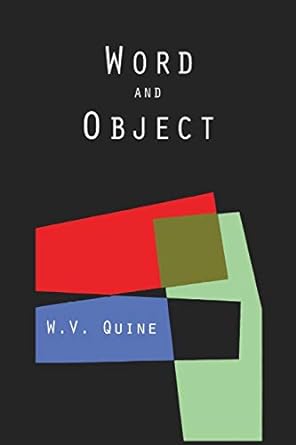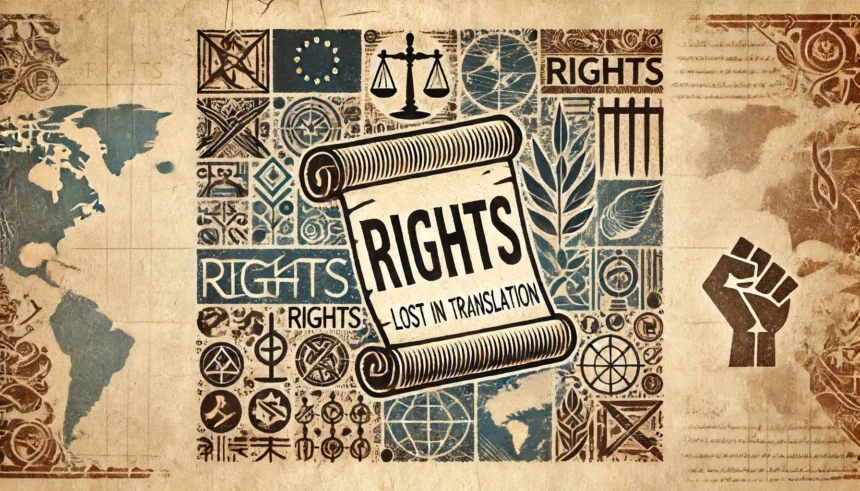In his book Words and objectsIn , W. V. Quine describes the problems that arise when trying to translate a totally unfamiliar language. Among the ideas he brings up in his discussion are the following: When trying to translate what someone is saying, The principle of charityQuine meant that we should assume that “assertions that are apparently stunningly false are likely to be due to hidden differences in language.” If your translation suggests that the other person has said something obviously stupid, you should assume that something has been lost in translation, rather than assuming that you are talking to a fool. And Quine points out that this is not limited to translating from an unknown language, but that the same problem can arise in “domestic cases” as a result of “linguistic differences.”

I try to apply this thinking, however imperfectly, when I speak with others, and it occurred to me recently that a proper accounting of these “linguistic differences” might help me to understand more generously the way some people talk about rights.
The view on the issue is Explained Michael Huemer A legal perspective (Notably, in that paper Huemer specifically Property RightsHowever, the same view is often taken about rights more generally. Huemer, in his legal opinion,
Property rights, in every aspect and detail, depend on laws enacted by governments. (Note: property rights are not only legal rights, they are also moral rights. This is why stealing is not only illegal but also unethical. The legal scholar’s view is that not only do certain legal rights depend on the law, but the relevant moral rights also depend on the law.)
This is an idea I’ve heard in various forms over the years. Its proponents often say, “Rights only exist to the extent that they are established by society and enforced by the state. It is confusing to call something a ‘right’ if it is not socially enforceable. If it is not supported and enforced by the state or society, it is not a right.”
Now, this way of thinking has always seemed to me, to use Quine’s words, shockingly wrong at first glance, because it has some rather absurd implications. For example, I take it for granted that slavery represented the greatest institutionalization of human rights violations in history. But on the view that “rights exist only if enforced by the state,” slavery was not a violation of rights at all. If rights exist only if the state (or a sufficiently strong social convention) endorses and enforces them, then wherever and whenever slavery is enforced by the state and generally seen as acceptable by citizens, slaves do not experience a violation of their rights, because they do not actually have any rights. On this view, the infamous Dred Scott decision, which declared that African Americans “have no rights which white people are bound to respect,” was not a serious error but (at least at the time) a statement of plain fact. If your theory is that slavery does not violate anyone’s rights so long as society endorses it and the state enforces it, you need a better theory.
At least that’s always seemed to me. But now I wonder if perhaps hidden or linguistic differences might lead us to see this in a different light. I was recently reminded of a discussion in the comments section of this blog a few years ago about the nature of rights (yes, I remember these things, but I usually don’t remember my brother’s birthdays!). One commenter said: Protected If you believe that the legal view of rights is that rights exist and can be “denied” even when the social context does not clearly recognize those rights, then I cannot agree with that argument. I believe there are many rights that society should create and protect, but those rights do not exist until society exercises them.
But he realized that his opinion could possibly be salvaged because a commenter was saying something different. The post was discussing: Loving v. Virginia The lawsuit that overturned the ban on interracial marriage. The legal opinion this commenter defends would have to say that such laws violated no one’s rights before they were repealed, and the commenter accepts that implication, but adds that he believes “the Lovings had the right to marry.” But before the court’s decision, they did not have that right.
So here is my suggestion that might fill this gap. This commenter wrote that the Lovings Should have had The right to marry means that it is wrong for the state to prevent people from marrying. To say that “it is wrong for the state to prevent people from marrying” is to me means It is wrong to say that people have the right to X. If I say, “People have the right to freedom of speech,” I am saying that it is wrong for the state to forcibly silence people’s speech. Prescriptive The assertion of a right allows us to evaluate what laws are appropriate and inappropriate. In this view, laws and treaties can be rights-violating. According to another definition of this right, to say that “people have the right to freedom of speech” is Descriptive Assertions are true or false and are governed by the laws and customs of a particular society. Thus, in this view, laws and customs cannot infringe rights, since a “right” simply means “something recognized and enforced by law or custom.”
Now consider that this commenter also said, “I believe there are many rights that society should create and protect, but they don’t exist until society implements them.” This is something It exists independently and prior to social coercion, and its specific something It should be protected and recognized. should Intending to protect these things and not doing so is a failure that must be corrected. For people like me, that antecedent is what we talk about when we talk about rights, what we mean when we say that rights exist independently, before they are formally recognized and enforced by the state or social conventions. This commenter and I something It precedes state policies and social practices and determines what those policies and practices dictate. should I call it “the existing one.” something There is a “right” but he doesn’t have it.
As a further example, here is another thought experiment that Huemer presents in his aforementioned paper, with an additional caveat:
Imagine you’re exploring in a remote wilderness area outside of government jurisdiction, and you come across a clearing with a crude cabin. The cabin appears to have been built by a hermit, and he is the only occupant. Since property rights depend entirely on government laws (or social customs – KC), and none are enforced here, you decide that the cabin does not belong to the hermit. Despite the hermit’s loud protests, you decide to spend the night in the cabin, eat some of the food the hermit has grown and gathered, and paint the cabin lime green. You don’t have to do any of this – just do it for fun.
In this thought experiment, hermits are not under the jurisdiction of any government, and there are no governing social conventions. And yet it seems clear that if we do these things, we are doing something wrong to hermits. And I think that almost everyone who accepts a legal view of rights would admit, if pressed, that it is wrong to do these things to hermits. Well, the wrongness of these acts is, for people like me, simply what it is. means The hermit has property rights here and you have violated them. If you agree that it is wrong to do these things to the hermit, then you are essentially agreeing with what I am saying: the hermit has rights even in the absence of state or societal coercion, even if you express the situation in different vocabulary.
My point in this post is not to say that one definition of “rights” is objectively correct or that one is practically better than the other (I may get to that in a future post, but I will hold off for now). My point is that much of the disagreement about whether rights exist prior to or independently of the state may simply stem from linguistic differences in what the word “rights” refers to.







